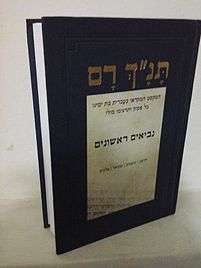Tanakh Ram
Tanakh Ram (Hebrew: תָּנָ"ךְ רָם) is a translation of the Hebrew Bible or Christian Old Testament from the Hebrew and Aramaic original texts to the Modern Hebrew currently spoken in the State of Israel. The translation is being done by the Polish-Israeli linguist Avraham Ahuvya. The translation is copyrighted by the RAM-Publishing House Ltd. and by Miskal Ltd. The word Ram is an acronym of the name of Rafi Moses, the books' editor and President of the RAM-Publishing House.
Publications

Up to October 2014 there have been published two volumes corresponding to the Torah or Moses' Law, and to the former prophets. The Torah, of dark red hardcovers and 760 pages, includes the books of Genesis, Exodus, Leviticus, Numbers and Deuteronomy; the second volume, dark blue and with 621 pages, includes Joshua, Judges, Samuel and Kings.
The first volume, the Torah, was published in 2010, and the second one in 2011. Two more volumes, corresponding to the latter prophets and to the Writings, are currently being prepared.
Just like any book written in Hebrew or other languages of right-to-left writing, the front cover of each volume is in the place of the back cover, so that it can be read in the opposite direction than of a book that is written in a Western language. The text of each one of the books of the Bible is presented in Ancient Hebrew on the right and on the left there is a parallel column, in a different font type, with the Modern Hebrew text. At the end of each volume there is a section with tables of measures and weights aimed to be a reference to the reader.
The books are officially sold by the bookstore Yediot Books in Israel.[1]
Reception

Being this a new Targum, its publication caused diverse opinions among the Jewish community in Israel. Some sectors argue that it is inconvenient for the reading of the sacred text in that it deviates from the traditional reading established by the masoretes, while other sectors consider that this new translation will allow the new generations to get closer to the Old Hebrew text.[2][3] Scholars like the linguist Ghil'ad Zuckermann have given support to the idea of the Tanakh Ram since, according to his own words, "The bottom line is that Israelis misunderstand the Hebrew Bible".[4]
References
- ↑ Volume I and volume II in Yediot Books webpage (in Hebrew).
- ↑ Israeli life: translating the Bible into Hebrew (2012) in Hadassah magazine.
- ↑ Five questions for Abraham Ahuvya: Tanakh Hebrew-Hebrew (2010) in Haaretz (in Hebrew).
- ↑ Do Israelis understand the Hebrew Bible? By Ghil'ad Zuckermann, in The Bible and Critical Theory, Vol. 6 No. 1 (2010).